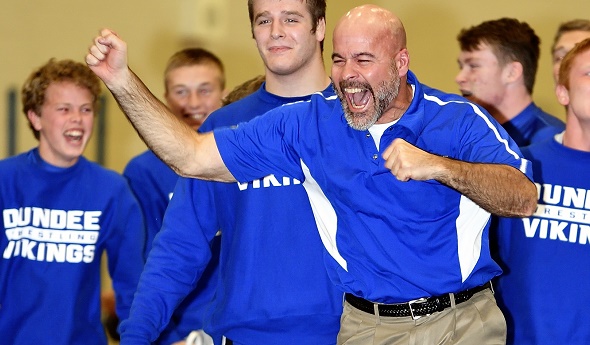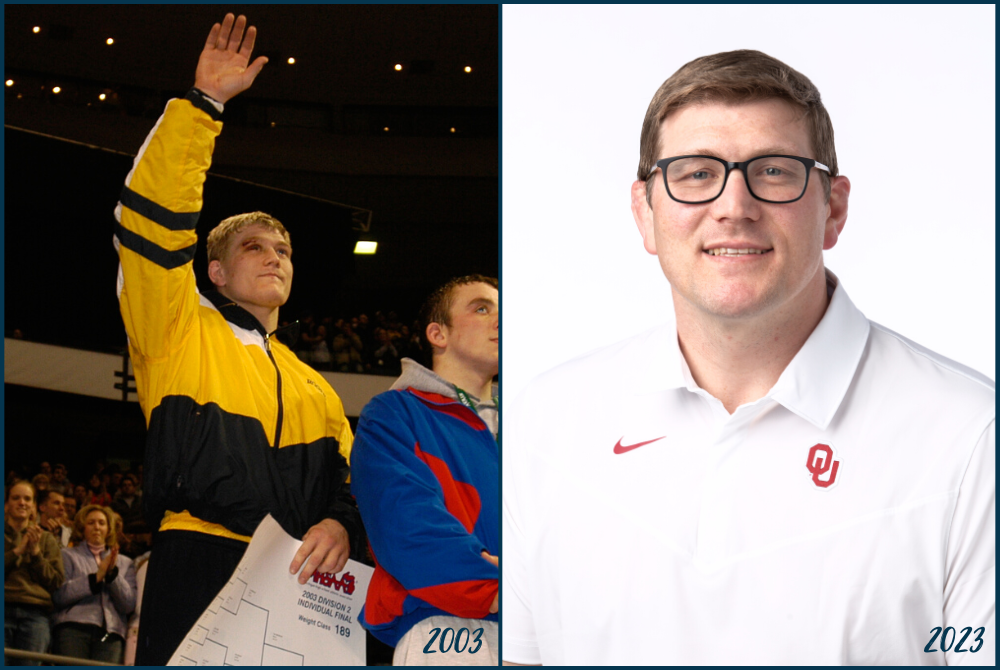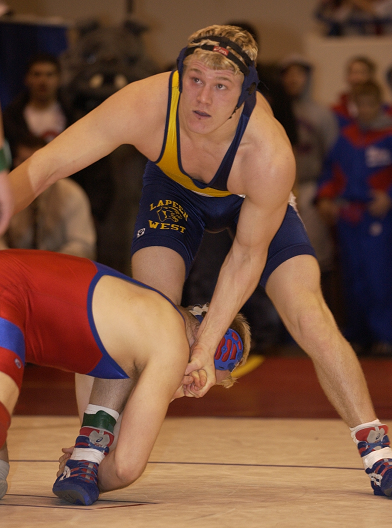
Roberts Drives Dundee to Chase Dream
January 8, 2019
By Doug Donnelly
Special for Second Half
DUNDEE – The thing that keeps Dundee wrestling coach Tim Roberts motivated isn’t another dual meet victory, matching up with state powerhouse Hudson in a conference meet or hanging another banner inside the Vikings’ gymnasium.
 Those things are nice, but what keeps Roberts going in his 20th season as the Dundee head coach is a certain two-time MHSAA Finals-qualifying wrestler from the mid-1980s who won 120 matches for Dundee but ultimately fell short of his goals.
Those things are nice, but what keeps Roberts going in his 20th season as the Dundee head coach is a certain two-time MHSAA Finals-qualifying wrestler from the mid-1980s who won 120 matches for Dundee but ultimately fell short of his goals.
That wrestler was Roberts.
“I’m always trying to prove myself, and I’m always trying to get better,” Roberts said. “When I think of myself as that kid who didn’t place at state, I do much better because I keep that hunger and desire. I need to learn more. I’ve got to get better at this.”
Roberts is already pretty good at what he does – a hall of famer, says Hudson coach Scott Marry, a seven-time MHSAA championship-winning coach himself.
“Coach Roberts is one of the best coaches I’ve ever coached against,” Marry said. “He gets his kids ready mentally and physically. You better have your team ready if you’re going to wrestle Dundee.”
Earlier this season, Roberts reached a career milestone – 500 career wins. He’s led Dundee to six Finals titles and six runner-up finishes, 19 District and 18 Regional titles. He’s coached 32 Individual Finals championship wrestlers and more than 140 all-staters. Under his leadership, Dundee also is approaching 20 Lenawee County Athletic Association titles.
The numbers don’t tell the full story about Roberts, however.
“I could write a book about Tim and how great a coach he is,” said Dundee athletic director Tom Oestrike. “His coaching profile speaks for itself, but what is even more impressive are the type of young men he has helped build in his career – men of selflessness, character and discipline.”
When Roberts wrestled at Dundee, he was a 98-pound freshman who grew to compete in the 126-pound weight class as a senior.
“We were a solid program at the time, (but) winning state was an impossible dream back then for sure,” Roberts said.
“I wasn’t bad at wrestling. I was pretty good. Compared to the guys we have now – I wasn’t as good as them. I thought I was pretty good, but I didn’t accomplish the goals that I wanted to.”
After high school, he enlisted in the Army. It was during that time that he got the coaching bug. He realized he wanted to help young student athletes learn how to get the most out of their careers.
“When I was in the military, I learned a lot about building myself into something and I wanted to share that information,” he said. “I thought about wrestling a lot and how I really didn’t accomplish the goals that I would have liked to, and I wanted to help other people. I had this desire to try to help. I felt like I had a knack for it.”
After his first year as an assistant coach, Dundee changed wrestling head coaches and Jim Wittibslager got the job. Roberts asked him if he could stay on as an assistant.
Wittibslager is a hall of fame coach in his own right. He compiled a record of 333-36-3 in two stints as the Dundee head coach. The Vikings won four straight MHSAA Finals titles during his tenure, from 1995-98.
“We went from a team 4-21 with zero state qualifiers, and by the fifth year we were state champs with 14 state qualifiers,” Roberts said. “It was quite a building process. It was lot of fun to go through and learn. Winning state went from an impossible dream to something that ‘Oh yeah, we could do this.’ We built ourselves into that level.”
Coaching with Wittibslager was a career-changer for Roberts.
“That was crucial in my development in how to coach,” he said. “I thought I had a knack for helping people and I had a little talent in that area, but I learned so much about what it takes, the work ethic and how to win and how to think like a winner.”
Admittedly, Roberts isn’t the same coach he was two decades ago. The sport has evolved significantly.
“I don’t coach now like I did 20 years ago, I’ll say that,” he said. “You grow with the times or you get left behind.”
What hasn’t changed during that time is Roberts’ attention to detail, his passion for coaching the right technique and getting his team ready for meets. Practices now include time in the weight room, warming up with some gymnastics moves such as back handstands, leaps and cartwheels; and, of course, technique.
“We still do conditioning,” he said. “We do quite a bit of that.”
Roberts believes one thing that sets wrestlers apart from each other is how far they can push themselves on the mat – when they reach the point where they feel they don’t have any more strength or ability, they find it.
“The only way you know if you can (push yourself) is by getting (to that point). That, as much as anything, will win you matches,” he said.
Maintaining that success has never been easy. Dundee typically has about 20 wrestlers out each year, a comparably low number to some other high-level programs. But that is where Roberts does his best work. Coaching at the high school level, he said, isn’t about coaching extraordinary athletes – it’s about coaching the average ones.
“It’s been an endless process for 20 years to keep trying to get better at this,” he said. “Average people are who you are coaching. That’s what coaching high school is, I think, learning how to work with the average person. Then, once in a while, you get to work with the exceptional person and that’s fun.”
Despite the enormous success during his 20 seasons at Dundee, Roberts has experienced the same highs and lows as any other coach.
“Lots of highs and lows,” he said. “Lots of times of feeling great, then you get humbled. Then you start feeling great again and then humbled again.”
Roberts coached Dundee to a Division 4 championship in 2001 and Division 3 titles in 2007, 2013, 2014, 2016 and 2018. Last year’s team was ranked nationally and had 14 Individual Finals qualifiers.
“Every one of those (championships) is like the best day of my life,” Roberts said. “Every time. It’s such a great feeling in the end that it all came together, and everything did work, and you did get it all done. A lot of things have to go right. It’s not easy.”
Roberts, 50, isn’t planning on stepping away from coaching any time soon. He’s also not stopping to think about reaching 500 career wins any time soon. He’d rather think about that high school wrestler who missed out on winning a state championship – but has had a remarkable impact on so many others.
“That’s for when you are done (coaching),” he said. “Right now, I’m still trying to get better and trying to work on my weaknesses as a coach and always seeking out how I can be better at this. When you’re done is when you get to reflect.”
 Doug Donnelly has served as a sports and news reporter and city editor over 25 years, writing for the Daily Chief-Union in Upper Sandusky, Ohio from 1992-1995, the Monroe Evening News from 1995-2012 and the Adrian Daily Telegram since 2013. He's also written a book on high school basketball in Monroe County and compiles record books for various schools in southeast Michigan. E-mail him at [email protected] with story ideas for Jackson, Washtenaw, Hillsdale, Lenawee and Monroe counties.
Doug Donnelly has served as a sports and news reporter and city editor over 25 years, writing for the Daily Chief-Union in Upper Sandusky, Ohio from 1992-1995, the Monroe Evening News from 1995-2012 and the Adrian Daily Telegram since 2013. He's also written a book on high school basketball in Monroe County and compiles record books for various schools in southeast Michigan. E-mail him at [email protected] with story ideas for Jackson, Washtenaw, Hillsdale, Lenawee and Monroe counties.
PHOTO: Dundee wrestling coach Tim Roberts and his team celebrate one of the many successful moments during his two decades leading the program. (Photo by David Schankin.)

Lapeer West 4-Time Finals Winner Set to Build Champions at Oklahoma
By
Paul Costanzo
Special for MHSAA.com
July 5, 2023
Roger Kish has a habit of accomplishing great things in a short amount of time.
 He won an MHSAA Individual Wrestling Finals title as a freshman at Lapeer West, his first of four.
He won an MHSAA Individual Wrestling Finals title as a freshman at Lapeer West, his first of four.
He was an NCAA finalist as a sophomore at Minnesota.
He was a Division I head wrestling coach at North Dakota State University at 27.
So, it should come as little surprise that before hitting his 40th birthday, Kish is now in charge of one of the nation’s most storied college wrestling programs.
Kish, 39, was recently named the head coach at Oklahoma, a program that has won seven national titles and produced 67 individual champions in its history.
“It’s something I’m very grateful for, and I’m certainly humbled to walk the same halls of some of the Oklahoma greats,” the 2003 Lapeer West graduate said. “Being able to lead this program is nothing short of a dream come true. The administration is great, and in terms of the support system that’s in place, what they have at Oklahoma is second to none.”
Kish takes over a Sooners program fighting to get back into the conversation as one of the nation’s best. His time at NDSU portends well for that, as he had the Bison as high as No. 12 in the country a year ago, the highest ranking in program history.
NDSU also defeated Oklahoma in a Big 12 dual meet, and finished 24th at the NCAAs, with a program record 25.5 points.
“Roger knows what it takes to build a championship-caliber program, and he’s done just that at North Dakota State, with many of his wrestlers having won conference titles and earning All-American honors,” Oklahoma Director of Athletics Joe Castiglione said in a release. “His coaching philosophy aligns with our approach at Oklahoma, and I know he’ll guide our wrestling program toward achieving the standards we’ve set for ourselves.”
Had you told a teenage Kish this would be his future as he was racking up the second-most wrestling victories in state history, he wouldn’t have believed it. Not because it was too ambitious, but because coaching wasn’t even on his radar.
In fact, it wasn’t something he was considering even as he was becoming a two-time All-American at Minnesota.
 “I would be lying to say that I wanted to be a high school or college wrestling coach, career-wise,” Kish said. “I had other plans.”
“I would be lying to say that I wanted to be a high school or college wrestling coach, career-wise,” Kish said. “I had other plans.”
Those other plans were to either continue wrestling beyond college, explore a career in mixed martial arts, or become a chiropractor.
It was all on the table for him as his collegiate career came to a close, but an injury and the long recovery process that followed opened up a new avenue for Kish.
“When I had my surgery, I was off the mats for a lot of time, but I was still able to be on the mats, not as a competitor, but in a way that I could help some of my younger teammates,” he said. “I wanted to be able to give back to those guys that had helped me. That’s where it all began.”
He had been accepted into the chiropractic program at Northwestern Health Sciences University in Bloomington, Minn. But he chose to put that off to continue his recovery for a possible mat return, and to serve as a graduate assistant for the Gophers.
The following year, he was asked to join Bucky Maughan’s coaching staff at North Dakota State, and his career as a coach took off.
“Throughout that year (at Minnesota), I really enjoyed helping out those young guys,” Kish said. “I took an opportunity from Bucky Maughan, because he needed a bigger guy to train with those bigger guys. It seemed like the best route in the moment, so I took it and never looked back. I was an assistant for two seasons, and built really good relationships with stakeholders in the athletic department. Following two seasons under Bucky Maughan, he retired after 46 seasons, and the position opened up. They did a national search, and I think the relationships I had built with stakeholders, and the immediate success of the program in the two seasons I was part of it, led to a great opportunity for me to take over at North Dakota State.”
Kish built a strong program in his 12 seasons at the helm, compiling a 108-70 record. During his time, the Bison moved from the Western Wrestling Conference to the Big 12 and didn’t skip a beat. NDSU is 33-26 in its time in the Big 12, including a 6-2 mark this past season, which was good enough for fourth place during the regular season.
NDSU has sent 21 wrestlers to the NCAA Championships over the past four seasons, with nine becoming All-Americans.
While it’s now in the corner and not in the center of the mat, Kish and wrestling success have long been synonymous.
Kish was 117-27 at Minnesota, placing second in the nation as a sophomore and third as a junior. He also won a Big Ten title at 184 pounds as a sophomore.
He was 252-2 in his high school career, with both losses coming during his freshman season. The 252 wins are second in MHSAA history only to 260 won by Justin Zeerip of Hesperia. Kish was unbeaten in his last 223 matches, placing him third all-time for consecutive wins behind Zeerip and Brent Metcalf of Davison (228).
In 2003, Kish became the 11th wrestler in MHSAA history to win four individual titles. At the time, nobody had won them at higher weights, as Kish won at 160, 171, 189 and 189.
“For me, it probably didn’t feel as big in the moment as it probably did for other people,” Kish said. “For me, it was the expectation to win it as a freshman. My own father said, ‘I don’t know if he’s going to get out of the Regional.’ I took it very personal and serious. But I didn’t think of how hard it was to do in the moment. I’m in awe of how talented these (more recent four-timers) are. Doing it today is seemingly a lot more challenging.”
Wrestling has long been a family experience for Kish, as his father, Roger Kish Sr., coached alongside Hall of Famer John Virnich at Lapeer West.
Kish’s older brother James was a two-time Finals champion who wrestled at North Carolina and amassed 215 career high school victories.
“I was fortunate enough to have a father who gave a tremendous amount of care to the sport and was always trying to keep my brother and I busy throughout our youth,” Kish said. “He always had us in some sort of activity. It probably also stemmed from having an older brother that was a couple years older than myself. I was always a little bit bigger, and he was a little more agile. We were always competitors – call it a brother thing. That allowed each of us to excel in sports, having one another to compete with.”
Kish also played football at Lapeer West and was a starting varsity linebacker as a freshman.
“Wrestling was my passion,” Kish said. “I loved playing football, but it was what I did to take a break from wrestling. It allowed some different facets to cultivate in terms of building relationships and recognizing different factors that helped motivate individuals. … Understanding being on a team, and relying on and trusting other people to help you succeed, whether that’s your teammates or your coaches.”
As someone who made the most of his time in high school athletics, and now remains close to them in a recruiting aspect, Kish is fully aware of how important they are for students.
“Having an outlet for young kids to be active and learn the traits that will help them later in life – the discipline and the humility of wins and losses, the work ethic that’s necessary, understanding what goals are and how to achieve those goals, dreaming a little bigger than what’s realistic – is good for kids,” Kish said. “Athletics is a great platform to do that. Wrestling is a great platform to do that. To help them grow as young men and women, that’s extremely important.”
Made in Michigan is powered by Michigan Army National Guard.
PHOTOS (Top) Roger Kish stands atop the MHSAA champions podium in 2003, and was hired as Oklahoma’s head coach in May. (Middle) Kish helps Lapeer West to the Division 2 team runner-up finish with this match against Mason as a senior. (Lapeer West photos from MHSAA archives; Oklahoma photo courtesy of University of Oklahoma athletic department.)

